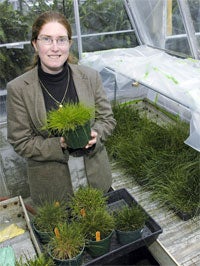 KINGSTON, R.I. — February 1, 2006 — With snow covering the grass and the soil frozen solid, few people are putting much thought into their lawns. But for turfgrass researcher Rebecca Brown, winter is a crucial time of year for the health of many lawns.
KINGSTON, R.I. — February 1, 2006 — With snow covering the grass and the soil frozen solid, few people are putting much thought into their lawns. But for turfgrass researcher Rebecca Brown, winter is a crucial time of year for the health of many lawns.
That’s because snow and ice season is also the season when road salt is used in abundance, and salt is a natural enemy of most grasses.
“Road salt is important for maintaining safe driving conditions during the winter months, but it can lead to dead grass along our roadsides,” said Brown, an assistant professor of plant sciences at the University of Rhode Island. “Most people don’t realize that the grass beneath the snow is still physiologically active. It’s still somewhat green, it’s still taking in water, and it’s highly susceptible to salt damage.”
Brown notes that some grasses are naturally tolerant of salt, especially those in the West where they grow year round in salty soils.
“The grasses we use in our lawns and along the roads in Rhode Island aren’t adapted to salt, and they don’t adapt over time because we don’t allow them to go to seed,” Brown said. “And salt tolerant western grasses may not grow well here because our salinity is only seasonal — in the winter the grass has to survive the road salt, but during the rest of the year salt isn’t a factor because our soil doesn’t hold the salt.”
So Brown is working to find native grasses that can thrive during the region’s winter salt season as well as in the salt-free months. With the support of the Rhode Island Department of Transportation, which is considering a switch from planting non-native turfgrasses along roads to native grasses, she is evaluating the salt tolerance of 16 grass species to identify the best choices for planting along roadsides.
“Roadsides are an artificial, human-constructed environment,” said the South Kingstown resident who joined the URI faculty in 2004, “and we don’t know if our native grasses can live there.”
According to Brown, who earned her Ph.D. at Oregon State University, which is located in the country’s major grass seed production region, salt tolerant grasses may not be able to compete with crabgrass and other annual weeds that are common along roadsides.
“RIDOT is constantly striving to attain the perfect balance of road safety and environmental protection,” said R.I. Department of Transportation Director James R. Capaldi, “That’s why we were pleased to be included in URI’s study of the development of alternative products that help grass mixes better resist road salt.”
Salt tolerance isn’t just a roadside issue, though. Coastal residents struggle to maintain healthy lawns in the face of frequent salt spray, and low-lying golf courses are occasionally flooded by surging salty seas as well. Across the nation, golf courses are switching to using reclaimed water or even seawater for irrigation, but lack of salt tolerance in the grass is a major limiting factor.
“If grasses were more tolerant of salt, lots of places might turn to alternative water sources for irrigation and reduce demands on drinking water supplies,” Brown said.
URI News Bureau Photo by Michael Salerno Photography.

